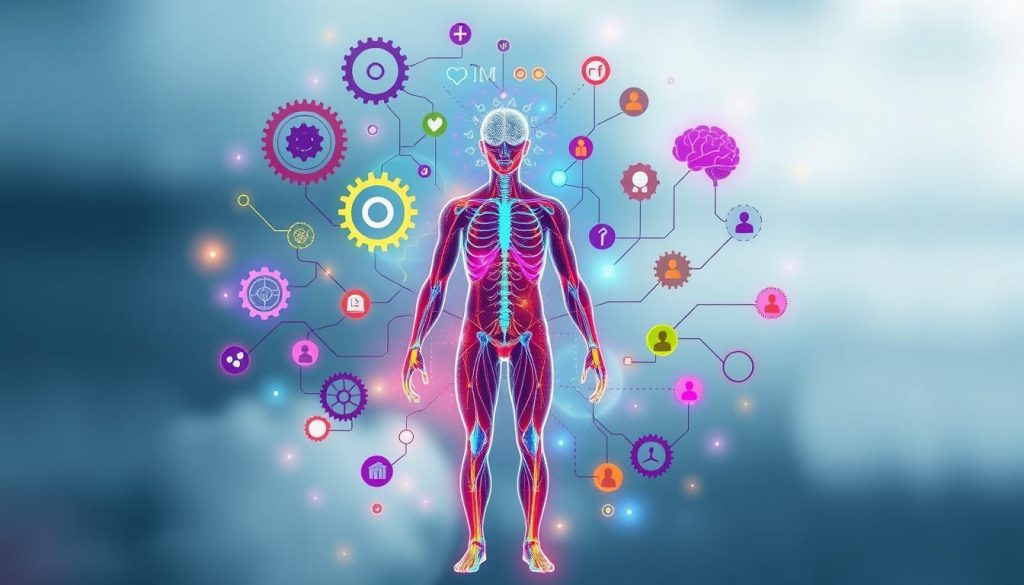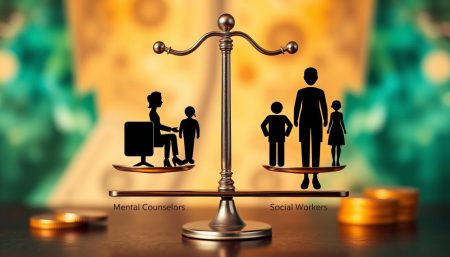We often see our physical and mental health as separate things. But, health psychology shows they are closely linked. The biopsychosocial model explains this connection well. It shows how our body and mind work together, affecting our health.
When we get sick, it can really affect our mind. Even small health issues can change how we feel mentally. Health is more than just not being sick. It’s about our body, mind, and how we fit into society.
In this article, we’ll look at how our body affects our mind. We’ll see how physical problems can change our mental state. By the end, you’ll understand why we should treat physical and mental health together.
Key Takeaways
- Understanding the profound connection between physical and mental health is crucial for holistic well-being.
- The biopsychosocial model offers a comprehensive framework to view health in its entirety.
- Physical ailments affect mental wellness, often leading to a cascade of psychological changes.
- A unified approach to health can provide more effective care and support for individuals.
- An exploration of how various physical conditions impact psychological states sets the stage for deeper insight and empathetic care.
Understanding the Connection Between Physical and Mental Health
Looking into how our physical state and mental health are connected shows us the complex nature of health. At the heart of this is the mind-body connection. It plays a key role in both the cause and treatment of psychosomatic disorders.
What is the Mind-Body Connection?
The mind-body connection is the strong link between our emotional and mental health and our physical health. This connection works both ways. Our thoughts and feelings can change our physical health, and our physical health can also affect our mental state. Symptoms of somatization show how our mental distress can turn into physical symptoms.
The Role of the Brain in Physical Health
The brain is a hub of activity, controlling our physical responses and understanding our emotions. Its role in linking mental and physical health is crucial. When we feel stressed mentally, it can show up physically, often in psychosomatic disorders.
How Mental Health Influences Physical Health
Mental health has a big impact on our physical health. For example, long-term stress or depression can cause inflammation, weaken our immune system, or harm our heart. This shows how important it is to take care of our mental health to keep our physical health strong.
In summary, the connection between mind and body is not just a theory. It’s a real, powerful force that affects our health. Understanding and working on this connection can help us manage our health better and lead healthier lives.
Common Physical Conditions Impacting Mental Health
Physical conditions and mental health are closely linked. Chronic illnesses, cardiovascular diseases, and autoimmune disorders can deeply affect our mental state. They not only affect our bodies but also our minds, making it crucial to treat both together.
Chronic Illnesses
The link between chronic illness and mental health is complex. Conditions like diabetes, cancer, and multiple sclerosis require constant care. This can lead to stress, depression, and anxiety due to the ongoing strain.
Cardiovascular Diseases
Heart problems affect more than just the heart. Heart attacks or ongoing issues like high blood pressure can cause a lot of stress. This stress can make the heart condition worse, creating a big challenge for patients.
Autoimmune Disorders
Autoimmune diseases pose a unique challenge for physical disability and mental well-being. Conditions like rheumatoid arthritis or lupus make the body attack itself, leading to unpredictable symptoms. This unpredictability can cause mood swings and frustration, affecting mental health.
| Condition | Psychological Impact | Common Psychological Symptoms |
|---|---|---|
| Chronic Illness | Stress and anxiety due to ongoing health management | Depression, anxiety |
| Cardiovascular Disease | Post-event stress, lifestyle change pressures | Stress disorders, depression |
| Autoimmune Disorders | Frustration and sadness from unpredictable symptoms | Mood swings, depression |
Dealing with these conditions needs more than just medicine. It also requires strong mental health support. This shows how important it is to treat both body and mind together. It’s clear that our physical and mental health are deeply connected.
The Effects of Pain on Mental Well-being
Chronic pain affects more than just the body. It also impacts mental health, often causing or worsening depression. Learning how to manage pain is key to improving mental health and quality of life.
Chronic Pain and Depression
Living with chronic pain can be very isolating and stressful. It can lead to feelings of hopelessness and depression. Research shows that dealing with pain can trigger depression, making everyday tasks hard.
Pain’s Influence on Daily Life
Chronic pain controls many aspects of daily life. It limits work, social activities, and even simple tasks. This can reduce independence and emotional well-being.
Here is a comparative look at aspects affected by chronic pain:
| Aspect | Effect of Chronic Pain |
|---|---|
| Work Life | Reduced productivity, frequent absences, potential job loss |
| Social Interactions | Decreased social gatherings, strained relationships |
| Mental Health | Increase in anxiety and depressive symptoms |
Managing Pain to Support Mental Health
Effective pain management is vital for both physical and mental health. Using a mix of medical and holistic methods helps manage chronic pain and depression. Techniques like physical therapy, exercise, counseling, and mindfulness are crucial.

Using a team approach ensures both physical and mental challenges are tackled. This is essential for improving well-being and mental strength in those with chronic pain.
The Role of Nutrition in Mental Health
What we eat affects how we feel. This connection is key in mental health. It shows a strong link between food and our mental well-being.
Nutritional Deficiencies
Eating a balanced diet is crucial for our brains. Lack of vitamins and minerals can lead to depression and anxiety. Foods rich in B vitamins, vitamin D, omega-3, and magnesium help our mood.
The Gut-Brain Connection
The gut and brain talk to each other. This system helps our gut work right and keeps our emotions in check. A healthy gut makes neurotransmitters like serotonin, mostly found in our gut.
How Diet Influences Mood
Our diet changes our gut bacteria, which affects our mood. Eating too much sugar can make mood disorders worse. But, foods like veggies, fruits, and fish can help keep our mood up.
| Nutrient | Benefits | Food Sources |
|---|---|---|
| Omega-3 Fatty Acids | Promotes brain function and emotional health | Fatty fish, flaxseeds, walnuts |
| Vitamin D | Important for mood regulation and nerve health | Fatty fish, fortified dairy products, sunlight |
| Magnesium | Supports neurotransmitter functions | Green leafy vegetables, nuts, seeds, whole grains |
| B Vitamins | Essential for energy and brain function | Whole grains, eggs, dairy, leafy greens |
Exercise as a Tool for Mental Wellness
Exploring the link between physical activity and mental health is key. Exercise and mental health are closely connected. Regular physical activities boost both body and mind, helping to reduce stress.
Physical Activity and Endorphins
Exercise triggers the release of endorphins, known as ‘feel-good’ hormones. These hormones improve mood and happiness, fighting stress and anxiety.
Exercise’s Role in Stress Reduction
Adding exercise to your routine can lower stress levels. Activities like walking, yoga, or weightlifting help the body and mind. They improve mental clarity and stress management.
Finding the Right Exercise Routine
Choosing an exercise routine that fits your style and ability is crucial. It keeps you consistent and enjoying the mental health perks. Here’s a guide to find the best physical activity for you:
| Lifestyle | Low Impact Choices | High Impact Choices |
|---|---|---|
| Busy Professionals | 30-min walk, Yoga | CrossFit, Spinning |
| Students | Team sports, Swimming | HIIT, Competitive sports |
| Retirees | Gardening, Tai Chi | Tennis, Aerobics |
Sleep Disorders and Their Mental Health Impact
The link between sleep and mental health is well understood today. Getting enough sleep is key for both physical and mental health. It affects our mood, energy, and how well we think. But, sleep disorders can upset this balance, making mental health issues like anxiety worse.
It’s important to tackle these sleep problems to improve our overall health and happiness.
The Importance of Sleep for Mental Health
Sleep is the base of good mental health. It helps our brain functions, like how nerve cells talk to each other. Not enough sleep makes us more emotional and less able to handle stress.
This is why sleep quality is so linked to anxiety and depression.
Sleep Disorders Commonly Associated with Anxiety
Many sleep disorders are tied to anxiety. Issues like insomnia, sleep apnea, and restless legs syndrome can make anxiety worse. Insomnia, for example, makes it hard to fall or stay asleep, especially for those with anxiety.
This cycle of poor sleep and anxiety makes it even harder to sleep well.
Tips for Improving Sleep Quality
Improving sleep is key to managing sleep disorders and anxiety. Here are some tips:
- Stick to a regular sleep schedule, even on weekends.
- Have a calming bedtime routine to signal it’s time to sleep.
- Make your sleep area comfortable, with things like blackout curtains and a good mattress.
- Avoid screens and blue light before bed, as they can mess with your sleep hormone.
Using these tips can make your sleep better, which helps with anxiety and improves your mental health.
| Sleep Disorder | Impact on Anxiety | Improvement Strategy |
|---|---|---|
| Insomnia | Increases stress, worry, and tension | Regular sleep schedule |
| Sleep Apnea | Leads to poor sleep quality, contributing to daytime anxiety | Use of CPAP machine at night |
| Restless Legs Syndrome | Prevents deep sleep, causing daytime fatigue and irritability | Iron supplements or medication |
How Hormones Affect Mood and Mental Health
Hormones are key to our mood and mental health. This section looks at how hormonal imbalances affect our minds. It also talks about managing hormones for better mental health.
Understanding Hormonal Imbalances
Hormonal imbalances happen when there’s too much or too little hormone in our blood. These imbalances can cause many problems, like mood swings and fatigue. They can also lead to weight changes and blood pressure issues, affecting our mental health.
Hormones like estrogen and testosterone play a big role in our brain’s chemistry. This shows a strong link between hormones and mental health.
Conditions Linked to Hormonal Changes
Some conditions, like thyroid disorders, can make us feel depressed or anxious. Polycystic Ovary Syndrome (PCOS) can also cause anxiety and depression. It’s important to manage these hormonal imbalances to improve our mental health.
Managing Hormonal Health for Better Mental Well-being
Managing hormonal imbalances needs both medical help and lifestyle changes. Eating well, exercising regularly, and getting enough sleep are key. For specific issues, treatments like hormone replacement therapy might be needed.
Seeing a healthcare provider who knows about endocrinology or reproductive health is a good idea. They can help create a plan just for you. Understanding and managing hormonal imbalances is important for both our physical and mental health.
| Condition | Hormonal Imbalance | Common Mental Health Issues |
|---|---|---|
| Thyroid Disorders | Hyperthyroidism or Hypothyroidism | Depression, Anxiety |
| PCOS | Elevated Androgen Levels | Depression, Anxiety |
| Menopause | Decreased Estrogen | Mood Swings, Depression |
The Psychological Effects of Major Physical Changes
Major physical changes, like recovering from illness or injury, change both the body and mind. It’s important to understand these changes to support overall well-being.
Coping with Chronic Illness Diagnosis
Getting a chronic illness diagnosis is a big moment that can cause deep emotional pain. People often feel shocked, then go through many emotions, from denial to acceptance. It’s key to find ways to cope with illness, manage anxiety, and stay positive about treatment.
Body Image and Mental Health
Physical changes can deeply affect how we see our bodies. Changes like weight shifts, scars, or other visible marks can impact mental health. It’s crucial to promote positive body image and realistic standards to help people adjust and keep their self-esteem.
Support Systems and Mental Resilience
Having a strong support system is vital when facing big physical changes. Family, friends, and support groups offer crucial help and understanding. This support helps build mental strength, making it easier to deal with physical health changes.
For more on how physical changes affect mental health, check out Chrissy Metz’s weight loss journey. It shows the challenges and victories of significant body changes.
Mental Health Resources for Physical Health Issues
When physical health problems meet mental health, finding wellness can be tough. Many resources now help people find mental health support for their physical issues.
Types of Therapies Available
There are many therapies for the mind’s response to physical health issues. Cognitive-behavioral therapy (CBT) teaches coping skills. Psychotherapy looks at how emotions react to illness. Group therapy offers a place to share and get support.
How Support Groups Can Help
Support groups offer a lot of help. They provide emotional and practical support from others who face similar challenges. These groups help people feel less alone and share ways to deal with daily life.
Engaging with Mental Health Professionals
Talking to mental health experts like psychologists and counselors is key. They offer tailored support and plans for both mental and physical health.
- Psychiatrists can prescribe medicines for both mental and physical symptoms.
- Occupational therapists help with lifestyle changes needed for physical conditions.
- Mental health counselors offer ongoing emotional support and coping strategies.
Each professional is important for the overall health of those dealing with both physical and mental health issues.

Understanding and using mental health resources can greatly improve life. It helps people recover and manage their health better. Being active in therapies and support groups leads to a supportive recovery path.
Strategies for Maintaining Mental Health with Physical Challenges
Dealing with mental health when facing physical challenges needs a wide range of strategies. It’s important to practice self-care, engage in mindfulness, and use the help of friends and family. These steps help keep your mental health strong during tough times.
Self-Care Practices
Self-care for mental health is key when you’re dealing with physical issues. It includes activities that help both your body and mind. Simple things like eating well, sleeping enough, and setting achievable goals can greatly improve your mood.
Mindfulness and Meditation
Mindfulness practices are very helpful for keeping your mind healthy, especially when you’re dealing with physical problems. Activities like meditation, deep breathing, or yoga help you stay focused on the now. This can lower stress and anxiety, making it easier to handle physical health issues.
Building a Strong Support Network
The support network benefits for your mental health are huge. Having a strong group of family, friends, and healthcare professionals is like having a safety net. They offer emotional support, advice, and the reassurance that you’re not alone.
Using these strategies takes dedication, but they really help improve your mental strength and emotional balance. Whether you’re facing a new health issue or managing ongoing physical problems, these methods offer practical ways to boost your mental health.
The Importance of Holistic Approaches to Health
The mind and body are connected, not separate. Holistic health approaches help us achieve complete wellbeing. They combine physical and mental care for lasting health.
Integrative Health Practices
Integrative health combines traditional and alternative therapies. It uses Western medicine with practices like mindfulness and acupuncture. This approach focuses on the patient’s whole life, improving care.
The Benefits of Combining Physical and Mental Health Care
Combining physical and mental health care has many benefits. It improves health, quality of life, and saves money. It helps manage chronic diseases better.
Finding Balance in Life
Balance is key in holistic health. It means health, lifestyle, and emotions are in harmony. This balance helps us face health challenges with strength and purpose.
FAQ
Q: What is the connection between physical and mental health?
A: Our health is about both our body and mind. Health psychology shows how physical issues can affect our mood and actions. This can lead to mental health problems over time.
Q: What is the Mind-Body Connection?
A: The mind-body connection is how our thoughts and feelings affect our body. Stress can show up as physical symptoms. At the same time, our body’s state can influence our mental health, all through our brain.
Q: How does mental health influence physical health?
A: Mental health affects our physical health in many ways. It can change our behavior and how our body reacts to stress. For example, anxiety can make our heart rate go up, while depression can affect our energy and immune system.
Q: How can chronic illnesses affect mental well-being?
A: Chronic illnesses can lead to stress, anxiety, and depression. Managing them can make us feel overwhelmed and worried. It can also change how we see ourselves and our future, affecting our mental health.
Q: How are chronic pain and depression related?
A: Chronic pain and depression are linked. Pain can make us feel sad and depressed. Depression can also make pain feel worse, creating a cycle that affects our life quality.
Q: How does diet influence mood and mental health?
A: What we eat affects our mood and mental health. Our gut and brain are connected, and good nutrition is key. Eating well can help us feel better, while bad nutrition can make us feel down.
Q: What role does exercise play in mental wellness?
A: Exercise is great for our mental health. It releases chemicals in our brain that make us feel good. Regular exercise can also help reduce stress and improve mood.
Q: Can sleep disorders impact mental health?
A: Yes, sleep problems can hurt our mental health. Poor sleep can make anxiety and depression worse. It can also make us feel irritable and stressed.
Q: How do hormonal imbalances affect mental health?
A: Hormonal issues can cause mood swings, anxiety, and depression. Hormones like cortisol and estrogen help control our mood. When they’re off balance, it can really affect how we feel.
Q: What are the psychological effects of a chronic illness diagnosis?
A: Getting a chronic illness diagnosis can be tough. It can make us feel shocked, scared, and uncertain. But, we can learn to cope and find ways to stay mentally strong.
Q: How can support groups help with mental health for those with physical health issues?
A: Support groups offer a place to share and connect. They help us feel less alone and learn new ways to cope. This can improve our mental health and overall well-being.
Q: What self-care practices can support mental health in the presence of physical challenges?
A: Self-care is important for our mental health. It includes relaxing activities, staying connected, and taking care of ourselves. Mindfulness and meditation can also help manage stress.
Q: Why is adopting a holistic approach to health important?
A: A holistic approach to health is key. It recognizes the connection between our body and mind. By focusing on all aspects of health, we can manage our conditions better and improve our life quality.


















